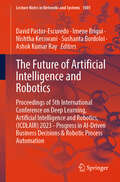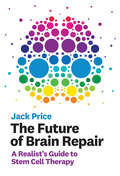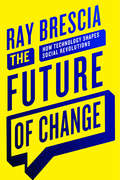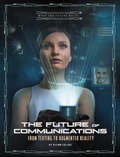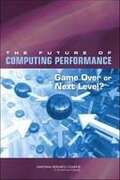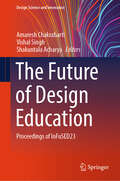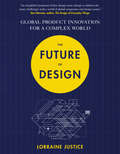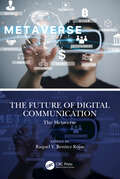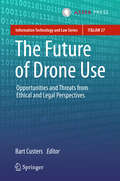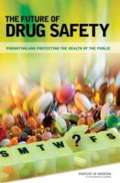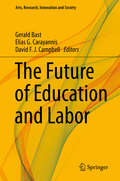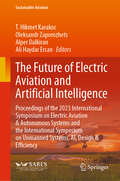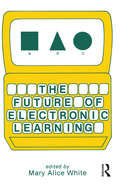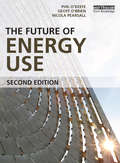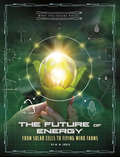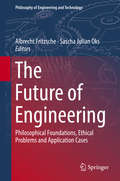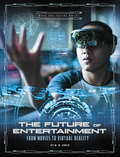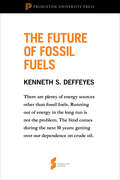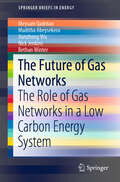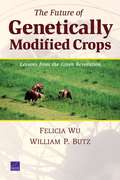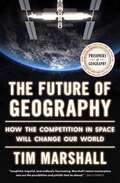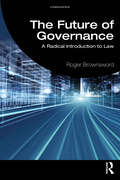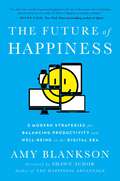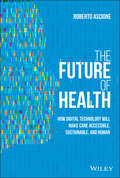- Table View
- List View
The Future of Artificial Intelligence and Robotics: Proceedings of 5th International Conference on Deep Learning, Artificial Intelligence and Robotics, (ICDLAIR) 2023 - Progress in AI-Driven Business Decisions & Robotic Process Automation (Lecture Notes in Networks and Systems #1001)
by Nishtha Kesswani Imene Brigui David Pastor-Escuredo Sushanta Bordoloi Ashok Kumar RayThis book includes the results from the 5th International Conference on Deep Learning, Artificial Intelligence and Robotics (ICDLAIR), held in National Institute of Technology, Kurukshetra, on December 07–09, 2023, which brought together visionaries, researchers, and industry leaders at the forefront of technological innovation. In the rapidly evolving landscape of technology, deep learning, artificial intelligence, and robotics stand as a beacon of innovation and intellectual exchange. Among the myriad of groundbreaking contributions, a notable gem emerges—a forthcoming book that promises to encapsulate the essence of the 5th International Conference on Deep Learning, Artificial Intelligence and Robotics, (ICDLAIR) 2023 proceedings. Titled " Progress in AI-Driven Business Decisions & Robotic Process Automation," this publication is poised to become a cornerstone for enthusiasts, researchers, and professionals seeking a comprehensive understanding of the latest advancements in deep learning, artificial intelligence, and robotics. Focused on the theme "Progress in AI-Driven Business Decisions & Robotic Process Automation," the conference showcased groundbreaking developments in the field, exploring the intersection of deep learning, artificial intelligence (AI), and robotics.
The Future of Brain Repair: A Realist's Guide to Stem Cell Therapy (The\mit Press Ser.)
by Jack PriceA scientist assesses the potential of stem cell therapies for treating such brain disorders as stroke, Alzheimer's disease, and Parkinson's disease.Stem cell therapies are the subject of enormous hype, endowed by the media with almost magical qualities and imagined by the public to bring about miracle cures. Stem cells have the potential to generate new cells of different types, and have been shown to do so in certain cases. Could stem cell transplants repair the damaged brain? In this book, neurobiologist Jack Price assesses the potential of stem cell therapies to treat such brain disorders as stroke, Alzheimer's disease, Parkinson's disease, and spinal cord injuries.Certainly brain disorders are in need of effective treatments. These disorders don't just kill, they disable, and conventional drug therapies have not had much success in treating them. Price explains that repairing the human brain is difficult, largely because of its structural, functional, and developmental complexity. He examines the self-repairing capacity of blood and gut cells—and the lack of such capacity in the brain; describes the limitations of early brain stem cell therapies for neurodegenerative disorders; and discusses current clinical trials that may lead to the first licensed stem cell therapies for stroke, Parkinson's and macular degeneration. And he describes the real promise of pluripotential stem cells, which can make all the cell types that constitute the body. New technologies, Price reports, challenge the very notion of cell transplantation, instead seeking to convince the brain itself to manufacture the new cells it needs. Could this be the true future of brain repair?
The Future of Change: How Technology Shapes Social Revolutions
by Ray BresciaIn The Future of Change, Ray Brescia identifies a series of "social innovation moments" in American history. Through these moments—during which social movements have embraced advances in communications technologies—he illuminates the complicated, dangerous, innovative, and exciting relationship between these technologies, social movements, and social change. Brescia shows that, almost without fail, developments in how we communicate shape social movements, just as those movements change the very technologies themselves.From the printing press to the television, social movements have leveraged communications technologies to advance change. In this moment of rapidly evolving communications, it's imperative to assess the role that the Internet, mobile devices, and social media can play in promoting social justice. But first we must look to the past, to examples of movements throughout American history that successfully harnessed communications technology, thus facilitating positive social change. Such movements embraced new communications technologies to help organize their communities; to form grassroots networks in order to facilitate face-to-face interactions; and to promote positive, inclusive messaging that stressed their participants' shared dignity and humanity. Using the past as prologue, The Future of Change provides effective lessons in the use of communications technology so that we can have the best communicative tools at our disposal—both now and in the future.
The Future of Communications: From Texting to Augmented Reality (What the Future Holds)
by Ailynn CollinsFrom the written word to the cell phone, human communication has come a long way. What might the future hold? Readers can discover how virtual reality, holograms, and a fully connected "internet of things" may affect how they communicate in the near and distant future.
The Future of Computing Performance
by Samuel H. FullerThe end of dramatic exponential growth in single-processor performance marks the end of the dominance of the single microprocessor in computing. The era of sequential computing must give way to a new era in which parallelism is at the forefront. Although important scientific and engineering challenges lie ahead, this is an opportune time for innovation in programming systems and computing architectures. We have already begun to see diversity in computer designs to optimize for such considerations as power and throughput. The next generation of discoveries is likely to require advances at both the hardware and software levels of computing systems. There is no guarantee that we can make parallel computing as common and easy to use as yesterday's sequential single-processor computer systems, but unless we aggressively pursue efforts suggested by the recommendations in this book, it will be "game over" for growth in computing performance. If parallel programming and related software efforts fail to become widespread, the development of exciting new applications that drive the computer industry will stall; if such innovation stalls, many other parts of the economy will follow suit. "The Future of Computing Performance" describes the factors that have led to the future limitations on growth for single processors that are based on complementary metal oxide semiconductor (CMOS) technology. It explores challenges inherent in parallel computing and architecture, including ever-increasing power consumption and the escalated requirements for heat dissipation. The book delineates a research, practice, and education agenda to help overcome these challenges. "The Future of Computing Performance" will guide researchers, manufacturers, and information technology professionals in the right direction for sustainable growth in computer performance, so that we may all enjoy the next level of benefits to society.
The Future of Design Education: Proceedings of InFuSED23 (Design Science and Innovation)
by Amaresh Chakrabarti Vishal Singh Shakuntala AcharyaThis book showcases cutting-edge research contributions from the International Symposium on Future of Design Education (InFuSED23) – written by eminent researchers from across the world on the topic ‘Future of Design Education’. The world is witnessing phenomenal change in terms of digital connectivity, movement from villages to towns and to megacities, major demographic movement across socio-economic strata, the looming threat of climate change and unsustainable development, terrorism and regionalism, major geopolitical shifts in the world order, and others. The practice of design, the “interdisciplinary discipline” as described by Nigel Cross, will have to play a major role in addressing the consequences of these changes, which by their very nature are people-centric and interdisciplinary. Therefore, design education must play a central role in training young minds in their evolving contributions as generic, empathic problem solvers for the world. InFuSED23 is intended to bring together top design researchers, teachers and thought leaders from across the world to deliberate on the topic “the future of design education” in its multiple perspectives: the aspects of design in which to train designers and design researchers, the manner in which the training is to be imparted, the levels at which training must be carried out, and so on.
The Future of Design: Global Product Innovation for a Complex World
by Lorraine JusticeHow can today's designers better engage with new and emerging technologies to take advantage of the opportunities these technologies can bring?"An insightful treatment of how design must change to address the many challenges with a world of global companies and design teams."--Don Norman, author, The Design of Everyday Things WHAT ARE THE 10 GLOBAL FACTORS THAT DETERMINE DESIGN SUCCESS?Using a wealth of examples from across multiple industries and countries, design expert Lorraine Justice fully explores the factors that will determine your success and provides a unique framework for navigating the industry into the future.You will learn how design and innovation are being impacted by new and emerging technologies, societal demands, cultural shifts, and broader world issues. The Future of Design is practical, concise and includes guidelines for building and supporting creative teams, advice and strategies for evaluating product concepts, and interviews with product designers, inventors, and innovators from around the world.
The Future of Digital Communication: The Metaverse
by Raquel V. Benítez RojasThis collection of essays explores the present and future of digital communication through a range of interdisciplinary approaches, all of which focus on the so-called metaverse. The metaverse is a combination of multiple elements of technology – including virtual reality, augmented reality, and video – where users "live" within a digital universe. The vision for this new universe is that its users can work, play, and stay connected with friends through everything. Such a vision is hinted at in existing phenomena such as online game universes.
The Future of Drone Use
by Bart CustersGiven the popularity of drones and the fact that they are easy and cheap to buy, it is generally expected that the ubiquity of drones will significantly increase within the next few years. This raises questions as to what is technologically feasible (now and in the future), what is acceptable from an ethical point of view and what is allowed from a legal point of view. Drone technology is to some extent already available and to some extent still in development. The aim and scope of this book is to map the opportunities and threats associated with the use of drones and to discuss the ethical and legal issues of the use of drones. This book provides an overview of current drone technologies and applications and of what to expect in the next few years. The question of how to regulate the use of drones in the future is addressed, by considering conditions and contents of future drone legislation and by analyzing issues surrounding privacy and safeguards that can be taken. As such, this book is valuable to scholars in several disciplines, such as law, ethics, sociology, politics and public administration, as well as to practitioners and others who may be confronted with the use of drones in their work, such as professionals working in the military, law enforcement, disaster management and infrastructure management. Individuals and businesses with a specific interest in drone use may also find in the nineteen contributions contained in this volume unexpected perspectives on this new field of research and innovation. Bart Custers is Associate Professor and Head of Research at eLaw, the Center for Law and Digital Technologies at Leiden University, The Netherlands. He has presented his work at international conferences in the United States, China, Japan, the Middle East and throughout Europe and has published over 80 scientific, professional and popularizing publications, including three books.
The Future of Drug Safety: Promoting and Protecting the Health of the Public
by Institute of Medicine of the National AcademiesIn the wake of publicity and congressional attention to drug safety issues, the Food and Drug Administration (FDA) requested the Institute of Medicine assess the drug safety system. The committee reported that a lack of clear regulatory authority, chronic underfunding, organizational problems, and a scarcity of post-approval data about drug's risks and benefits have hampered the FDA's ability to evaluate and address the safety of prescription drugs after they have reached the market. Noting that resources and therefore efforts to monitor medication's risk-benefit profiles taper off after approval, The Future of Drug Safety offers a broad set of recommendations to ensure that consideration of safety extends from before product approval through the entire time the product is marketed and used.
The Future of Education and Labor (Arts, Research, Innovation and Society)
by Elias G. Carayannis David F. J. Campbell Gerald BastThis book explores the ways in which education impacts labor markets. Specifically, the contributions in this book indicate that the future of labor is creative, socially aware and inter-disciplinary while identifying the changes and innovations needed in our educational systems to meet this demand.Due to an increasing automatization (robotic manufacturing), the character of labor and work in general will change dramatically in the near future. This will be the case not only in the western countries, but also in the larger emerging economies in Asia, for example China and India. While societal environments, economy and the character of labor are increasingly in a process of dramatic changes, the educational systems and the leading principles of research about labor and employment are not changing adequately. Cross-disciplinary (inter-disciplinary and trans-disciplinary) thinking and learning is not the main focus of our educational systems. Consequently, the systems of academic research follow and apply disciplinary or even sub-disciplinary strategies, avoiding cross-disciplinary research approaches, and not supporting inter-disciplinary academic career models. This book introduces such strategic models to better prepare the next generation of workers for the new knowledge economy, and the future of democratic societies.
The Future of Electric Aviation and Artificial Intelligence: Proceedings of the 2023 International Symposium on Electric Aviation & Autonomous Systems and the International Symposium on Unmanned Systems, AI, Design & Efficiency (Sustainable Aviation)
by T. Hikmet Karakoc Alper Dalkiran Oleksandr Zaporozhets Ali Haydar ErcanThe Future of Electric Aviation and Artificial Intelligence presents a unique collection of proceedings papers from two multi-disciplinary symposiums on sustainable aviation and unmanned systems, offering a comprehensive view of the latest research and insights. The International Symposium on Electric Aviation and Autonomous Systems (ISEAS 2023) presents aerospace, autonomous, and piloted unmanned systems research. The International Symposium on Unmanned Systems, AI, Design & Efficiency (ISUDEF 2023) gathers researchers, scientists, engineers, practitioners, policymakers, and students working on topics in the unmanned systems industry and artificial intelligence (AI). The collected papers provide insights on a broad range of current issues in aviation, including hybrid, electric, all-electric, and fuel cell aerial vehicles, electric generation, energy storage, propulsion technology, design issues, AI applications, efficient operations, and new identification and detection systems that adapt to the latest technology standards. ISEAS 2023 and ISUDEF 2023 allow researchers, scientists, engineers, practitioners, policymakers, and students to exchange information and professionals to present new technologies and developments and discuss future direction, strategies, and priorities in aviation and sustainability.
The Future of Electricity Demand
by Tooraj Jamasb Michael G. PollittWhat will electricity and heat demand look like in a low-carbon world? Ambitious environmental targets will modify the shape of the electricity sector in the twenty-first century. 'Smart' technologies and demand-side management will be some of the key features of the future of electricity systems in a low-carbon world. Meanwhile, the social and behavioural dimensions will complement and interact with new technologies and policies. Electricity demand in the future will increasingly be tied up with the demand for heat and for transport. The Future of Electricity Demand looks into the features of the future electricity demand in light of the challenges posed by climate change. Written by a team of leading academics and industry experts, the book investigates the economics, technology, social aspects, and policies and regulations which are likely to characterize energy demand in a low-carbon world. It provides a comprehensive and analytical perspective on the future of electricity demand.
The Future of Electronic Learning
by Mary Alice WhiteFirst Published in 1983. Routledge is an imprint of Taylor & Francis, an informa company.
The Future of Energy Use
by Geoff O'Brien Nicola Pearsall Phil O'KeefeFollowing the success of its predecessor, this second edition of The Future of Energy Use provides essential analysis of the use of different forms of energy and their environmental and social impacts. It examines conventional, nuclear and renewable sources and technologies, using relevant case studies and providing a vital link between technology and related policy issues. The new edition has been comprehensively developed and updated, including new text, diagrams and tables, with entire new sections that reflect the significant changes that have occurred since the first edition. New material includes: a stronger focus on climate change policy and energy security; a discussion of the long run marginal costs of oil; coverage of the biofuels debate in both the developed and developing worlds; an outline of developments in the built environment (including transport issues); and the relationship between behaviour and energy use. It reviews policy shifts with relation to energy efficiency, carbon capture and storage, combined heat and power, and combined cycle gas turbines. There is new coverage of nuclear waste, storage and proliferation, and new material on microgeneration and biofuels, as well as essential new information on carbon markets and the hydrogen economy. The result is a unique introduction and guide to all the vital issues within energy for students, academics and professionals new to the field.
The Future of Energy: From Solar Cells to Flying Wind Farms (What the Future Holds)
by M. M. EbochOur world runs on energy! But traditional fossil fuels are doing great damage to the environment, and they will eventually run out. How might solar, water, wind and geothermal power come to our rescue? Readers can discover how different the world could look in the future with energy sources that are clean and renewable.
The Future of Engineering: Philosophical Foundations, Ethical Problems and Application Cases (Philosophy of Engineering and Technology #31)
by Albrecht Fritzsche Sascha Julian OksIn a world permeated by digital technology, engineering is involved in every aspect of human life. Engineers address a wider range of design problems than ever before, raising new questions and challenges regarding their work, as boundaries between engineering, management, politics, education and art disappear in the face of comprehensive socio-technical systems. It is therefore necessary to review our understanding of engineering practice, expertise and responsibility.This book advances the idea that the future of engineering will not be driven by a static view of a closed discipline, but rather will result from a continuous dialogue between different stakeholders involved in the design and application of technical artefacts. Based on papers presented at the 2016 conference of the forum for Philosophy, Engineering and Technology (fPET) in Nuremberg, Germany, the book features contributions by philosophers, engineers and managers from academia and industry, who discuss current and upcoming issues in engineering from a wide variety of different perspectives. They cover topics such as problem solving strategies and value-sensitive design, experimentation and simulation, engineering knowledge and education, interdisciplinary collaboration, sustainability, risk and privacy.The different contributions in combination draw a comprehensive picture of efforts worldwide to come to terms with engineering, its foundations in philosophy, the ethical problems it causes, and its effect on the ongoing development of society.
The Future of Entertainment: From Movies to Virtual Reality (What the Future Holds)
by M. M. EbochFrom stage productions to television to movies, humans have always been entertained by a good story. But how might entertainment change in the future? From immersive virtual reality games to social media with 3-D holograms, readers can find out what cool new technologies might change the way they are entertained.
The Future of Fossil Fuels: From Hubbert's Peak (Princeton Shorts #4)
by Kenneth S. DeffeyesAs debates about the effects of fossil fuels on our climate and foreign policy intensify, the question of just how much longer we can depend on this finite source of energy becomes more and more pressing. This selection from Hubbert's Peak, the leading book on the limits of our oil supply, forecasts what the future will bring for fossil fuels and what the alternatives are likely to be. Princeton Shorts are brief selections excerpted from influential Princeton University Press publications produced exclusively in eBook format. They are selected with the firm belief that while the original work remains an important and enduring product, sometimes we can all benefit from a quick take on a topic worthy of a longer book. In a world where every second counts, how better to stay up-to speed on current events and digest the kernels of wisdom found in the great works of the past? Princeton Shorts enables you to be an instant expert in a world where information is everywhere but quality is at a premium. The Future of Fossil Fuels does just that.
The Future of Gas Networks: The Role of Gas Networks in a Low Carbon Energy System (SpringerBriefs in Energy)
by Nick Jenkins Jianzhong Wu Meysam Qadrdan Muditha Abeysekera Bethan WinterThis book investigates the role of gas networks in future low-carbon energy systems, and discusses various decarbonisation pathways, providing insights for gas network operators, developers, and policy makers. As more countries around the world move towards low-carbon energy systems and increase their exploitation of renewable energy sources, the use of natural gas and the associated infrastructure is expected to undergo a substantial transformation. As such there is a great uncertainty regarding the future role of gas networks and how they will be operated in coming years.The topics addressed include:Fundamentals of gas network operationThe impact of variable renewable electricity generation on the operation and expansion of gas networksThe impact of decarbonising heat supplies on gas networksOpportunities and challenges of utilising gas networks to transport alternative low-carbon gases such as bio-methane and hydrogen
The Future of Genetically Modified Crops
by William Butz Felicia WuThe world is now on the cusp of a new agricultural revolution, the so-called Gene Revolution, in which genetically modified (GM) crops are tailored to address chronic agricultural problems in certain regions of the world. This monograph report investigates the circumstances and processes that can induce and sustain this new agricultural revolution. The authors compare the Green Revolution of the 20th century with the GM crop movement to assess the agricultural, technological, sociological, and political differences between the two movements.
The Future of Geography: How the Competition in Space Will Change Our World (Politics of Place #4)
by Tim MarshallFrom the New York Times bestselling author of Prisoners of Geography and leading geopolitics expert comes an &“insightful, hopeful, and endlessly fascinating&” (Daily Express) book on today&’s space race—including the increasingly tense power struggle between the US, China, and Russia and what it means for all of us here on Earth.Spy satellites orbiting the moon. Space metals worth more than most countries&’ GDP. People on Mars within the next ten years. This isn&’t science fiction—it&’s reality. Humans are venturing up and out, and we&’re taking our competitive spirit with us. Soon, what happens in space will shape human history as much the mountains, rivers, and seas have impacted civilizations around the world. It&’s no coincidence that Russia, China, and the USA are leading the way. The next fifty years will change the face of global politics and the world order as we know it. In this must-read work, bestselling author Tim Marshall navigates the new astropolitical reality to show how we got here and where we&’re heading. Extensively researched, &“thought-provoking&” (Popular Science), and drawing on the latest information from intelligence, government, and civilian institutions, this book provides a detailed, clear account of the new space race, the power rivalries, and how technology, economics, and war have a ripple effect on everyone across the globe. Written with all the insight and wit that have made Marshall one of the world&’s most popular and trusted writer on geopolitics, The Future of Geography is an essential read about global power, politics, and the future of humanity.
The Future of Governance: A Radical Introduction to Law
by Roger BrownswordThis book offers a radically different introduction to law, one that reflects the challenges and opportunities presented by the rapid technological developments of our time.Traditionally, law has been about historic principles and rules and their application to a particular set of facts; and courts, judges, and disputes have been central to the legal enterprise. Against this approach, this book highlights four radical and revisionist ideas: by bringing modern technologies into the foreground; by presenting law as one particular mode of governance in a larger picture of governance that now includes technological modalities; by insisting that we have to think outside the traditional doctrinal box to engage with a broad range of governance questions; and by emphasising that human communities cannot flourish without good governance to which both lawyers and law are central. These four radical threads are woven into a discussion of the modern landscape of law, and together they offer a distinctly contemporary contribution to the quest for good governance. The challenge for lawyers now, the book maintains, is to contribute to thinking, both locally and globally, about how we take advantage of the opportunities presented by the newest technology, without compromising the essential conditions for human life and co-existence, and without losing what we value in law’s governance.This book is aimed at students who are studying law at university and legal academics, and others, interested in the current and future impact of technology on law.
The Future of Happiness: 5 Modern Strategies for Balancing Productivity and Well-Being in the Digital Era
by Amy BlanksonTechnology, at least in theory, is improving our productivity, efficiency, and communication. The one thing it's not doing is making us happier. We are experiencing historically high levels of depression and dissatisfaction. But we can change that. Knowing that technology is here to stay and will continue to evolve in form and function, we need to know how to navigate the future to achieve a better balance between technology, productivity, and well-being. Technology can drive—not diminish—human happiness. In The Future of Happiness, author Amy Blankson, cofounder of the global positive psychology consulting firm GoodThink, unveils five strategies successful individuals can use, not just to survive—but actually thrive—in the Digital Age: Stay Grounded to focus your energy and increase productivity Know Thyself through app-driven data to strive toward your potential Train Your Brain to develop and sustain an optimistic mindset Create a Habitat for Happiness to maximize the spaces where you live, work, and learn Be a Conscious Innovator to help make the world a better place By rethinking when, where, why, and how you use technology, you will not only influence your own well-being but also help shape the future of your community. Discover how technologies can transform the idea of "I'll be happy when . . ." to being happy now.
The Future of Health: How Digital Technology Will Make Care Accessible, Sustainable, and Human
by Roberto AscioneLearn how the future of medicine is being unlocked—one digital innovation at a time The Future of Health is an insightful and comprehensive overview of the past, present, and future of digital health. Accomplished health innovation leader Roberto Ascione delivers a practical exploration of how the latest digital technologies are transforming the practice of medicine and redefining health itself by making it more accessible, sustainable, and human. The book includes practical, real-world examples from the United States, Asia, and Europe of technology applications, companies, and start-up that have changed—or will change—our relationship with our health and the healthcare system. Readers will also find: How our health is becoming increasingly consumer and connected while technology is empowering patients in completely new ways and deeply transforming the doctor-patient relationship Discussions of how the training of medical professionals, particularly doctors, has changed—or needs to change—to meet the new digital reality Examinations of how new technologies will allow doctors to dodge many of the administrative and regulatory burdens they currently face each day Treatments of the ability of new technologies to unlock new, holistic ways of practicing medicine, with a focus on latest developments such as Digital Therapeutics and Virtual Reality Reflections on how digital health is fostering a shift “from cure to care” and will unleash a human-sized future for a more accessible, ubiquitous, and sustainable healthcare The Future of Health is required reading for medical practitioners and the managers of pharmaceutical companies. It will also earn a place in the libraries of medical device companies and healthcare entrepreneurs seeking an incisive treatment of the impact of digital technology on all aspects of healthcare. Also, the general public, interested in understanding how to take better control of their own health through digital technologies, will find this book insightful and easy to comprehend.
